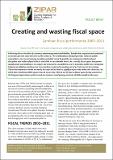| dc.contributor.author | Whitworth, Alan | |
| dc.coverage.spatial | Zambia | en_GB |
| dc.date.accessioned | 2014-06-04T17:45:21Z | |
| dc.date.available | 2014-06-04T17:45:21Z | |
| dc.date.issued | 2012 | |
| dc.identifier.citation | Whitworth, A. (2012) Creating and wasting fiscal space: Zambian fiscal performance 2002–2011. Policy brief 4, Lusaka: ZIPAR. | en_GB |
| dc.identifier.uri | https://opendocs.ids.ac.uk/opendocs/handle/20.500.12413/3967 | |
| dc.description.abstract | Following
three
decades
of
economic
mismanagement
and
decline,
Zambia
has
experienced
sustained
economic
growth
since
the
turn
of
the
century.
The
combination
of
rapid
growth,
reduced
public
expenditure,
increased
mining
taxation
and
debt
relief
helped
the
Government
establish
fiscal
discipline
and
reduce
fiscal
deficits
and
debt
to
sustainable
levels.
As
a
result,
fiscal
space
has
grown
significantly
and
Zambia
is
no
longer
aid
dependent.
In
addition,
lower
domestic
public
borrowing
has
helped
cut
inflation
and
interest
rates
and
has
reduced
crowding
out
of
private
sector
borrowing.
These
developments
would
normally
be
expected
to
lead
to
significant
poverty
reduction.
However,
by
2010
there
had
been
little
improvement
in
poverty.
This
is
partly
due
to
fiscal
space
being
wasted
on
ill-‐designed
agriculture
policies
and
uneconomic
road
paving
projects
of
little
benefit
to
the
poor. | en_GB |
| dc.language.iso | en | en_GB |
| dc.publisher | ZIPAR | en_GB |
| dc.relation.ispartofseries | Policy brief;4 | |
| dc.rights.uri | http://creativecommons.org/licenses/by-nc-nd/3.0/ | en_GB |
| dc.subject | Finance | en_GB |
| dc.subject | Governance | en_GB |
| dc.title | Creating and wasting fiscal space: Zambian fiscal performance 2002–2011 | en_GB |
| dc.type | Series paper (non-IDS) | en_GB |
| dc.rights.holder | Zambia Institute for Policy Analysis & Research | en_GB |


